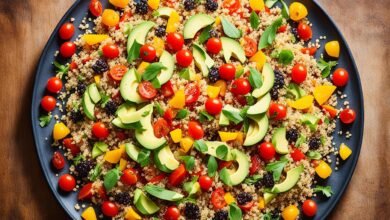
Irritable Bowel Syndrome (IBS) is a common gastrointestinal disorder that affects millions of people worldwide. It can cause a range of uncomfortable symptoms, including abdominal pain, bloating, diarrhea, and constipation. While IBS is a chronic condition without a known cure, many individuals find relief through dietary changes. In this article, we’ll explore strategies for managing IBS by highlighting foods to embrace and avoid to promote digestive comfort.
IBS in the United States
In the United States, Irritable Bowel Syndrome (IBS) is a prevalent health concern, impacting a significant portion of the population. According to the National Institute of Diabetes and Digestive and Kidney Diseases (NIDDK), an estimated 10 to 15 percent of Americans experience symptoms of IBS. The condition not only poses physical challenges but can also have a substantial impact on the quality of life for those affected. As healthcare professionals and researchers continue to delve into effective management strategies, dietary modifications remain a key focus. Understanding the unique dietary triggers for IBS in the context of American eating habits is crucial for individuals seeking relief and improved digestive well-being.
Understanding IBS
IBS characterizes a complex condition where the digestive tract is irritable and sensitive Symptoms can vary widely from person to person, and they often include abdominal discomfort or pain, changes in bowel habits (diarrhea, constipation, or both), bloating, and gas. Managing IBS effectively often begins with dietary adjustments.
Foods to Avoid
- High-FODMAP Foods: At first, FODMAPs (Fermentable Oligosaccharides, Disaccharides, Monosaccharides, and Polyols) are types of carbohydrates that can ferment in the gut and exacerbate IBS symptoms. Common high-FODMAP foods to limit or avoid include onions, garlic, wheat, some fruits (like apples and pears), and certain legumes.
- Dairy Products: Moreover, Lactose intolerance often goes hand-in-hand with IBS. Dairy products can trigger digestive discomfort for many individuals with IBS. Lactose-free alternatives or lactase supplements can be more suitable options.
- Fried and Fatty Foods: High-fat meals, especially those that are deep-fried or greasy, can provoke IBS symptoms. It’s advisable to opt for lean protein sources and cooking methods that use less oil.
- Caffeine and Alcohol: Caffeine and alcohol can stimulate the digestive tract, leading to increased bowel movements and discomfort. Reducing or eliminating these beverages may be beneficial.
- Artificial Sweeteners: Also, Certain sugar substitutes like sorbitol and mannitol are known to worsen IBS symptoms. Checking food labels for these ingredients can help prevent discomfort.
Foods to Embrace
- Soluble Fiber: Soluble fiber, found in foods like oats, psyllium husk, and some fruits (e.g., bananas), can help regulate bowel movements and reduce IBS-related constipation.
- Low-FODMAP Fruits and Vegetables: While some fruits and vegetables are high in FODMAPs, others are low in these fermentable carbohydrates. Opt for options like spinach, zucchini, and strawberries to support digestive comfort.
- Lean Proteins: Skinless poultry, fish, and lean cuts of meat are generally well-tolerated by people with IBS. These protein sources are less likely to trigger digestive symptoms.
- Probiotic Foods: Probiotics, found in yogurt with live active cultures or fermented foods like kefir and kimchi, can help promote a balanced gut microbiome and reduce IBS symptoms.
- Herbal Teas: Certain herbal teas, such as peppermint and ginger tea, have soothing properties and can provide relief from bloating and cramping.

Eating Habits to Embrace
In addition to specific food choices, it’s essential to adopt good eating habits for managing IBS:
- Smaller, Frequent Meals: Eating smaller, more frequent meals can help prevent overloading the digestive system and manage IBS symptoms.
- Hydration: Staying well-hydrated is crucial for digestive health. Drinking adequate water can prevent constipation and aid in overall well-being.
- Mindful Eating: Eating slowly and mindfully can help reduce the intake of air, which can contribute to bloating.




